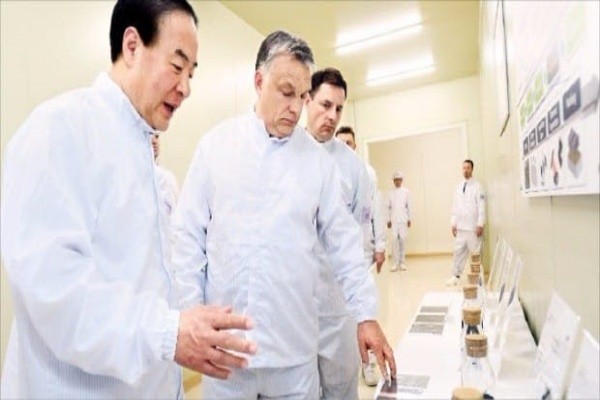Samsung SDI plans to double the number of its prismatic battery production lines at its Hungary plant by the end of this year and also begin construction of a second electric vehicle (EV) battery plant in Hungary. Its ultimate strategy is to gain dominance in the European prismatic EV battery market by investing about $890 million (1 trillion KRW). Such amount is considered very aggressive for Samsung SDI when the company has been relatively conservative for the past few years compared to other battery manufacturers. The investment can be seen as the company’s plan to take early action towards production of EVs by Volkswagen, Audi, and BMW and CATL entering the European market.
According to the industry on Tuesday, Samsung SDI plans to invest $890 million this year and build four additional prismatic battery production lines at its plant in Goed, Hungary.
Once the construction is finished, the company will have eight prismatic battery production lines at the plant and its prismatic battery production capacity will increase from 30 GWh to 50 GWh that is equivalent one million EV batteries in one year.
Samsung SDI also plans to break ground for a second EV battery plant in Hungary in the first half this year at the earliest. Once the company’s investment in facilities is completed, the company’s production capacity is expected to double from what it is now.
This will be the first time that the company will carry out a large investment towards its prismatic battery production lines at the Hungary plant. Although the company has been making supplemental investments continuously since it started operating the plant in 2018, it has yet to make any large investment to build additional lines until now. With this investment, the company will be able to take early action towards orders from Volkswagen, Audi, and BMW that are the company’s main customers.

Samsung SDI will become the biggest prismatic battery manufacturer in Europe with this investment. CATL is currently constructing a prismatic battery production plant with an annual capacity of 14 GWh in Erfurt, Germany. It plans to operate the plant in 2023 and is considering making either LFP or NCM batteries at the plant.
President Jun Young-hyun of Samsung SDI once made a statement this year that the company would start taking an aggressive approach and quickly increase production capacity in prismatic batteries for EVs.
Volkswagen announced that 80% of its EVs will be equipped with prismatic batteries and 20% of its EVs will be equipped with pouch-type batteries by 2030. Samsung SDI will increase its production capacity of high-end NCM batteries rather than low-end LFP batteries that CATL mainly make. As the global EV market is shifting from pouch-type to prismatic batteries, Samsung SDI is looking to react quickly towards changes in the market.
The company also invested in R&D in order to apply a new method to its production lines in Hungary. While increasing the size of prismatic batteries, it started using the stacking method that stacks battery cells in order during an assembly process. This method is expected to greatly increase prismatic batteries’ energy density that is a weakness of prismatic batteries.
In order to apply the stacking method, the company along with a South Korean battery equipment manufacturer called Philenergy developed an equipment that cuts electrodes with laser and stacks battery cells. The equipment is expected to increase energy density of prismatic batteries and greatly reduce production cost at the same time.
A representative for Samsung SDI said that in addition to increasing production capacity, the company will also work on increasing quality of its prismatic EV batteries in order to reduce rate of occurrence of defected products.
Staff Reporter Kim, Jiwoong | jw0316@etnews.com